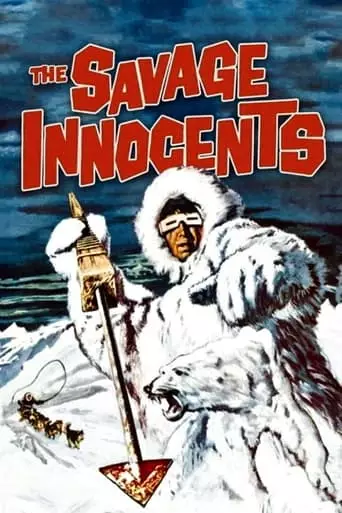
The Savage Innocents (1960) Watch Online Free
An Eskimo who has had little contact with white men goes to a trading post where he accidentally kills a missionary and finds himself being pursued by the police.
The Savage Innocents is a striking 1960 drama directed by Nicholas Ray and adapted from Hans Rüesch’s novel Top of the World. The film tells the story of an Inuit hunter, played by Anthony Quinn, living in the Arctic wilderness. Inuk, a man shaped by the raw, unyielding environment, adheres to traditional customs, including offering his wife’s company to guests as a sign of hospitality. However, this practice clashes with Western morality, particularly when he encounters a Christian missionary who finds the custom offensive. The confrontation escalates, leading Inuk to kill the missionary in a moment of cultural misunderstanding. Pursued by white policemen, the narrative explores survival, cultural clashes, and moral dilemmas as Inuk saves one of his pursuers, leading to a tense, poignant resolution.
Analysis
Nicholas Ray’s direction emphasizes the vast, desolate Arctic landscape as a metaphor for isolation and cultural alienation. The stark contrast between Inuk’s life and the encroaching influence of Western values underpins the film’s tension. Ray’s storytelling invites viewers to reflect on cultural relativism, as neither the Inuit way of life nor Western norms are presented as morally superior. The film’s minimal dialogue and immersive visuals highlight the primal struggle for existence, focusing on humanity stripped to its essentials.
Anthony Quinn delivers a powerful performance as Inuk, blending strength and vulnerability. His portrayal avoids caricature, allowing the audience to empathize with his internal conflict and cultural displacement. The supporting cast, including Yoko Tani as Asiak, Inuk’s wife, adds depth to the emotional stakes.
Themes
10 Reasons to Watch The Savage Innocents
What Will You Feel After Watching?
Viewing The Savage Innocents is likely to leave you reflective and unsettled. The stark depiction of cultural alienation and survival may prompt introspection about societal norms and personal morality. The film’s raw, emotional narrative can evoke a sense of empathy for those living on the margins of society and a deep respect for the resilience of indigenous cultures. Its unresolved tension lingers, urging viewers to consider the complexities of coexistence in an increasingly interconnected world.
In summary, The Savage Innocents is not just a cinematic journey through the Arctic but also an exploration of humanity’s moral and cultural boundaries, making it a film that resonates far beyond its setting.
